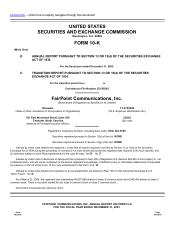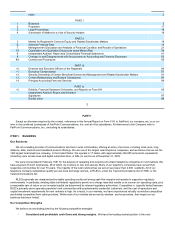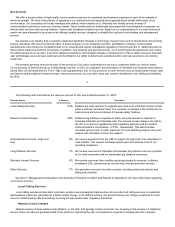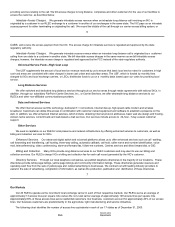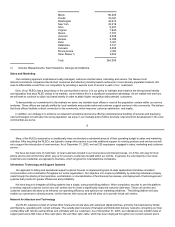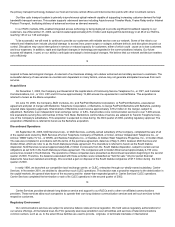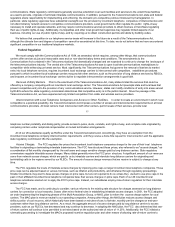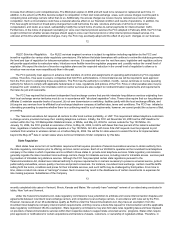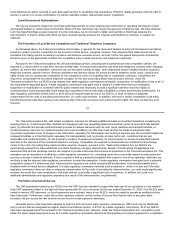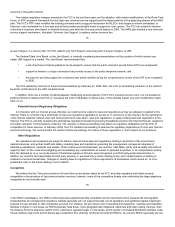FairPoint Communications 2003 Annual Report Download - page 10
Download and view the complete annual report
Please find page 10 of the 2003 FairPoint Communications annual report below. You can navigate through the pages in the report by either clicking on the pages listed below, or by using the keyword search tool below to find specific information within the annual report.
most instances we will be required to seek state approval prior to completing new acquisitions of RLECs. States generally retain the right to
sanction a carrier or to revoke certifications if a carrier materially violates relevant laws and/or regulations.
We may be required to obtain from municipal authorities permits for street opening and construction or operating franchises to install
and expand facilities in certain rural communities. Some of these franchises may require the payment of franchise fees. We have obtained
such municipal franchises as were required. In some rural areas, we do not need to obtain such permits or franchises because the
subcontractors or electric utilities with which we have contracts already possess the requisite authorizations to construct or expand our
networks.
As discussed above, the Telecommunications Act provides, in general, for the removal of barriers to entry into the telecommunications
industry in order to promote competition for the provision of local service. Congress, however, has recognized that states should not be
prohibited from taking actions necessary to preserve and advance universal service, and has further recognized that special consideration
should be given to the appropriate conditions for competitive entry in areas served by rural telephone companies.
Pursuant to the Telecommunications Act, all local exchange carriers, including both incumbents and new competitive carriers, are
required to: (i) allow others to resell their services at retail rates; (ii) ensure that customers can keep their telephone numbers when changing
carriers; (iii) ensure that competitors' customers can use the same number of digits when dialing and receive nondiscriminatory access to
telephone numbers, operator service, directory assistance and directory listing; (iv) ensure access to telephone poles, ducts, conduits and
rights of way; and (v) compensate competitors for the competitors' costs of completing calls to competitors' customers. Competitors are
required to compensate the incumbent telephone company for the cost of providing these interconnection services. Under the
Telecommunications Act, our RLECs may request from state regulatory commissions exemption, suspension or modification of any or all of
the requirements described above. A state regulatory commission may grant such a request if it determines that such exemption,
suspension or modification is consistent with the public interest and necessary to avoid a significant adverse economic impact on
communications users and generally avoid imposing a requirement that is technically unfeasible or unduly economically burdensome. If a
state regulatory commission denies some or all of any such request made by one of our RLECs, or does not allow us adequate
compensation for the costs of providing interconnection, our costs could increase. In addition, with such a denial, competitors could enjoy
benefits that would make their services more attractive than if they did not receive such interconnection rights. We have not filed any such
requests.
14
The Telecommunications Act, with certain exceptions, imposes the following additional duties on incumbent telephone companies by
requiring them to: (i) interconnect their facilities and equipment with any requesting telecommunications carrier at any technically feasible
point; (ii) unbundle and provide nondiscriminatory access to network elements such as local loops, switches and transport facilities, at
nondiscriminatory rates and on nondiscriminatory terms and conditions; (iii) offer their retail services for resale at wholesale rates;
(iv) provide reasonable notice of changes in the information necessary for transmission and routing of services over the incumbent telephone
company's facilities or in the information necessary for interoperability; and (v) provide, at rates, terms and conditions that are just,
reasonable and nondiscriminatory, for the physical co-location of equipment necessary for interconnection or access to unbundled network
elements at the premises of the incumbent telephone company. Competitors are required to compensate the incumbent local exchange
carrier for the cost of providing these interconnection services. However, pursuant to the Telecommunications Act, our RLECs are
automatically exempt from these additional incumbent telephone company requirements, except in Florida where the legislature has
determined that all local exchange carriers are required to provide interconnection services as prescribed in the Telecommunications Act. This
exemption can be rescinded or modified by a state regulatory commission if a competing carrier files a bona fide request for interconnection
services or access to network elements. If such a request is filed by a potential competitor with respect to one of our operating territories, we
are likely to ask the relevant state regulatory commission to retain the exemption. A state regulatory commission may grant such a potential
competitor's request if it determines such interconnection request is not unduly economically burdensome, is technically feasible and is
consistent with universal service obligations. If a state regulatory commission rescinds such exemption in whole or in part and if the state
regulatory commission does not allow us adequate compensation for the costs of providing the interconnection, our costs would significantly
increase, we would face new competitors in that state and we could suffer a significant loss of customers. In addition, we could incur
additional administrative and regulatory expenses as a result of the interconnection requirements.
The USF payments received by our RLECs from the USF fund are intended to support the high cost of our operations in rural markets.
Such USF payments related to the high cost loop represented 8% of our revenues for the year ended December 31, 2003. If our RLECs were
unable to receive USF payments, or if such payments were reduced, many of our RLECs would be unable to operate as profitably as they
have historically. Furthermore, under the current regulatory scheme, as the number of access lines that we have in any given state
increases, the per access line rate at which we can recover certain payments decreases.
Universal service rules have been adopted by both the FCC and some state regulatory commissions. USF funds may be distributed
only to carriers that are designated as eligible telecommunications carriers, or ETCs, by a state regulatory commission. All of our RLECs
have been designated as ETCs pursuant to the Telecommunications Act. However, under the Telecommunications Act, competitors could
obtain the same support payments as we do if a state regulatory commission determined that granting such support payments to competitors

